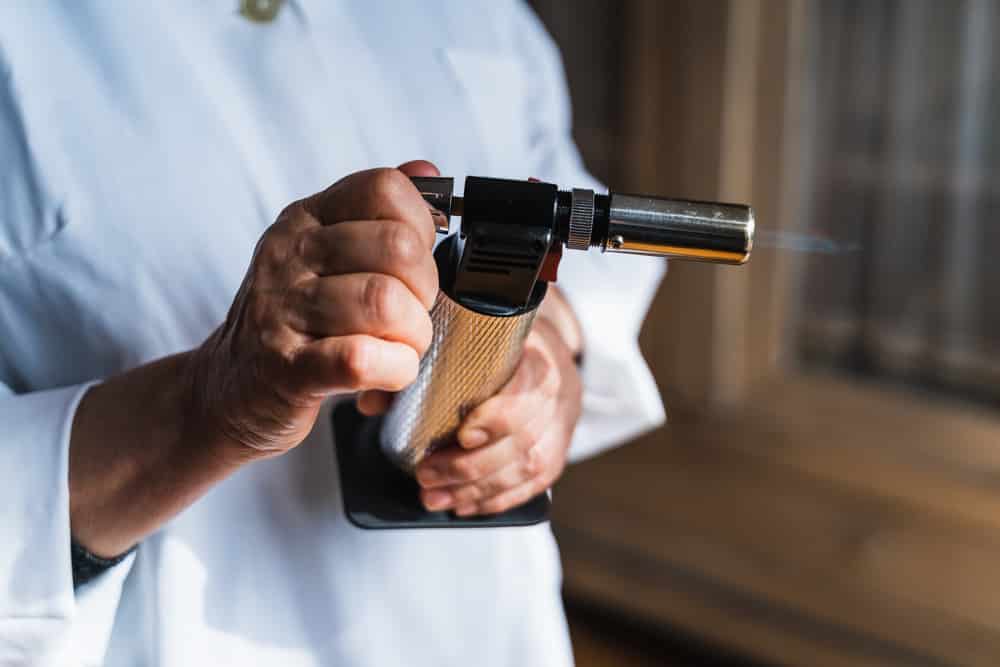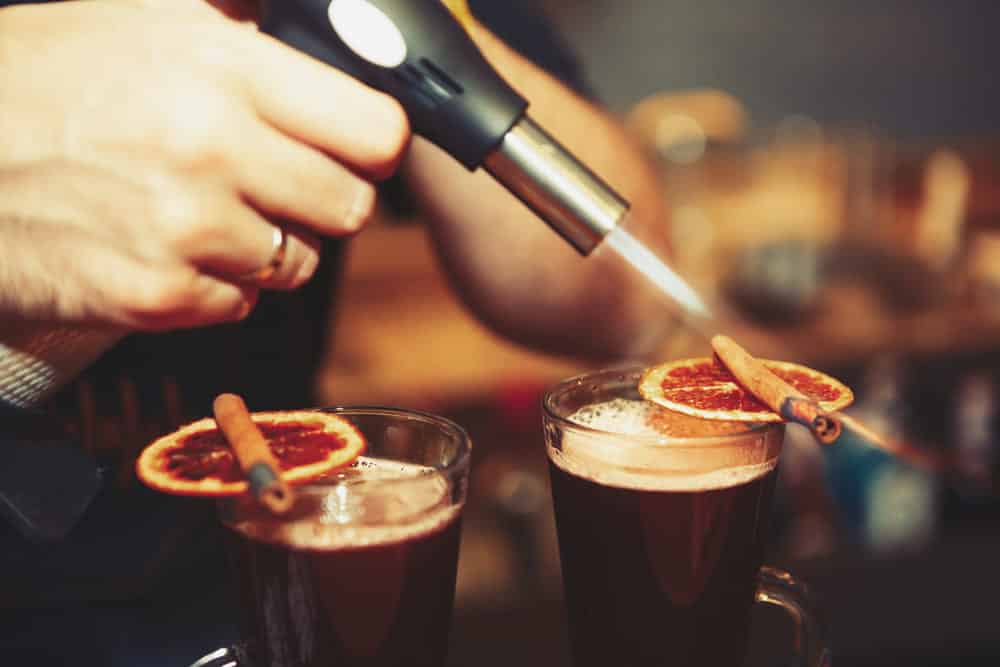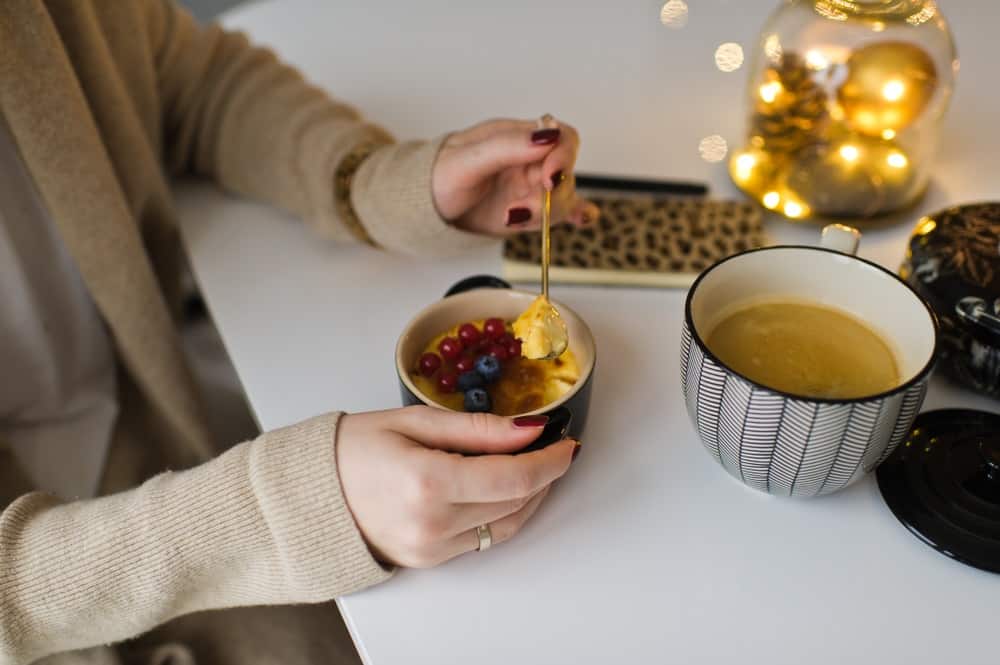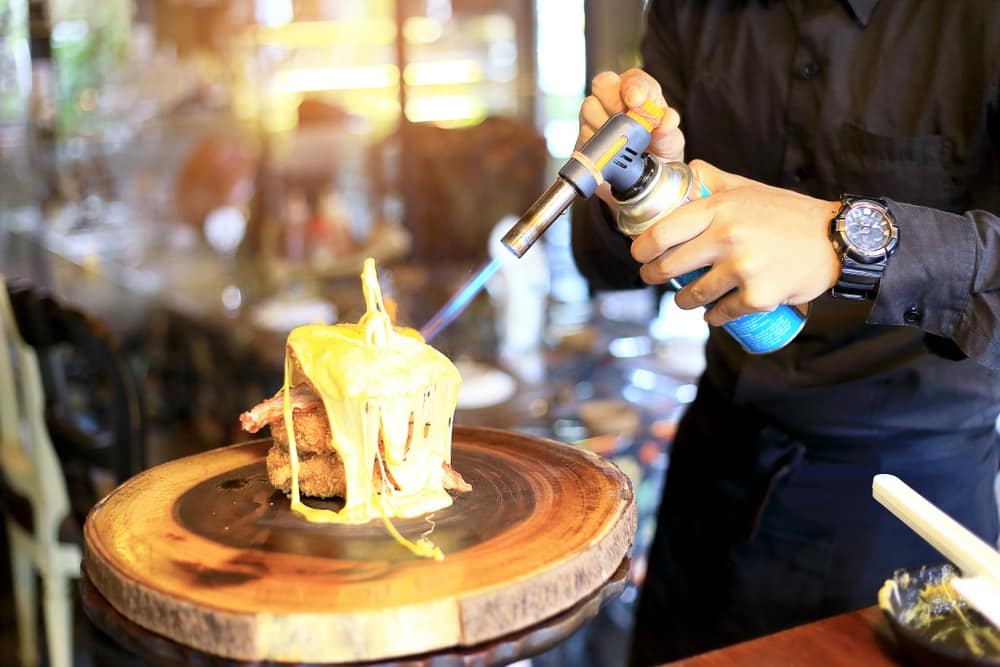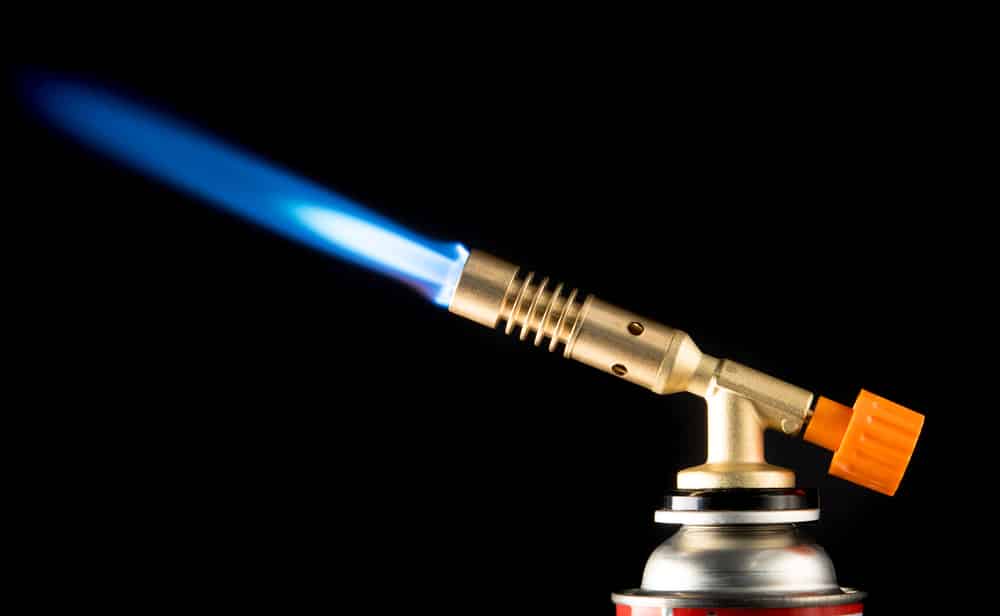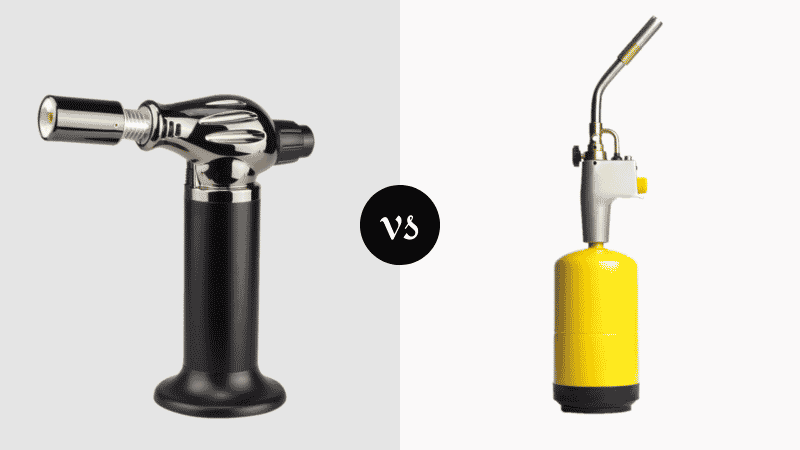
Anyone who is serious about cooking and culinary work will undoubtedly have a cooking torch in their kitchen, perhaps several actually.
There are a wide variety of torches available across today’s markets however the main difference you’ll immediately notice is the fuel type used.
We’ll be taking you through a comparison of butane vs. propane torch cooking so that you know exactly which is the better option for you.
Regardless of whether you use a propane or butane torch, both leave behind a slight taste and odor. Let’s take a closer look.
Butane Vs. Propane Torch Cooking Comparison
| Butane Torch Cooking | Propane Torch Cooking | |
| Definition | Torch Directing Compressed Butane To Tapered Spout Ignited By Spark To Offer Heat For Cooking & DIY | Torch Directing Compressed Propane To Tapered Spout Ignited By Spark To Offer Heat For Cooking & DIY |
| Names | Kitchen Torch, Cooking Torch, Culinary Torch, Blow Torch, Pocket Torch, Food Torch, Bartending Torch, Mixology Torch | Blow Lamp, Kitchen Torch, Cooking Torch, Culinary Torch, Blow Torch, Pocket Torch, Food Torch, Bartending Torch, Mixology Torch |
| Uses | Cooking & Browning Food, DIY | Cooking & Browning Food, DIY, Sub-Zero Operation |
| Difficulty | Low Difficulty But Harder To Control Effects Due To Cooler Than Propane Flame | Low Difficulty, Easier Than Butane Torch Due To Higher Temperature Flame |
| Affordability | $15-$20 Entry Level Price | $15-$20 Entry Level Price |
| Heat | 2400 °F – 2,610 °F |
3600 °F – 3623 °F.
|
| Aftertaste | No Aftertaste (Alkane Gas) | No Aftertaste (Also Alkane Gas) |
| Safety | Some Ventilation Required Due To Light CO2 Production | Good Ventilation Required Due To CO2 Production |
| Considerations | Cannot Be Used In Freezing Temperatures | Suitable For Use In Freezing Temperatures |
Butane Vs. Propane Torch Cooking
Our breakdown of butane torches versus propane torches has everything that you need to know to make the optimal purchase coming up.
Butane Torch
Depending on whether you grew up in a house where cooking or handiwork was performed more frequently, many would be extremely familiar with the multi-purpose butane torch.
Its tapered flame is ideal for use all around the house. Let’s take a closer look at how butane torch cooking compares to propane torch cooking.
Definition
A butane torch is a device comprised of a gas canister, trigger, and narrowed outlet that concentrates and directs butane towards its spout, where it is ignited as a controlled flame for heating food and various other surfaces.
As the name suggests, a butane torch uses the flammable gas butane as its fuel for creating an intense, fiery flame.
Butane torches work by dispensing liquid butane, which is stored in a pressurized container beneath the nozzle, into a tight stream which is then ignited using a spark from either a compressed piezoelectric crystal or a flint.
Names
Butane torches are often marked as kitchen torches, cooking torches, culinary torches, blow torches, pocket torches, food torches, bartending torches, or mixology torches.
Uses
While a butane torch is most often used for browning food, it is safe for cooking food directly as well.
The most common uses of butane torches in a kitchen are caramelizing sugar for desserts like crème brûlée, lemon meringue, and brûléed tarts. Torches are also used to melt cheese and brown toppings placed on soups and casseroles.
It works equally well for charring and roasting vegetables as well. In addition to the culinary uses, a butane torch is used by bartenders for flaming and smoking various cocktails.
Difficulty
Torching food is not complicated. One has to simply keep the point away from the food, preventing it from touching directly while allowing the surrounding heat of the torch to provide the cooking or browning action.
Most butane torches designed for culinary uses are easy to use but still slightly trickier to operate from a control standpoint because of the flame’s heat.
Despite reaching very high temperatures, butane torches still run cooler than propane torches which makes them more difficult to use.
While the notion may at first seem counterintuitive, a higher heat torch works better in the kitchen as one sees the direct result of their work immediately as it happens.
Affordability
Butane torches and propane torches retail for approximately the same price. You’ll be able to find either variety retailing for roughly $15 and above.
Butane is, however, the cheaper gas. The affordability of the fuel is barely a consideration to chefs due to the sparse amount even the busiest kitchen will use.
Heat
The majority of butane torches range in temperature between 2400 °F and 2,610 °F – a temperature range that’s largely considered a slow burn.
That makes a butane torch hot enough for melting light metals like aluminum and copper and a great asset to home repairs and the kitchen.
Aftertaste
As an alkane gas, butane will not impact the smell or flavor of the food it’s being used on.
Safety
When it comes down to using a butane torch, many people often ask if they are safe for food. Butane torches are safe because butane gas is an alkane that doesn’t produce byproducts.
A little carbon monoxide is produced as the slow flame burns, but this is not absorbed by the food. Yet, due to the carbon monoxide, we advise operating a butane torch with the windows open.
Considerations
You cannot use a butane torch in freezing temperatures of 30°F or below, which shouldn’t be of consequence to many cooks.
Propane Torch
A propane torch is a perfect option for people who want an economic torch and is easy to use. The majority of propane torches are designed with refillable or detachable propane tanks.
Definition
A propane torch is a torch that uses a gas canister, trigger, and outlet to direct the flow of pressurized flammable propane towards a tapered spout, where it is ignited using either the compression of a piezoelectric crystal or by means of a flint’s spark.
Names
You’ll find propane torches sold as blow lamps when they’re used in manufacturing, construction, metalwork, and other non-food-related applications.
Otherwise, all the standard kitchen torch terms apply, namely ‘Kitchen Torch,’ ‘Cooking Torch,’ ‘Culinary Torch,’ ‘Blow Torch,’ ‘Pocket Torch,’ ‘Food Torch,’ ‘Bartending Torch,’ and ‘Mixology Torch.’
Uses
Just like butane torches, propane torches are used for browning food but can be used for cooking food directly as well.
Caramelizing desserts is the most frequent use, while melting savory toppings like cheese is almost as common. Many cooks use their torch for searing meat, peeling peppers, and finishing off anything that needs browning.
Difficulty
The ultra-high heat of a propane torch makes it the preferred choice of chefs and slightly easier to use than a butane torch.
You see the results of your heating almost immediately as opposed to waiting a few moments for the browning action to occur when using butane.
Affordability
As mentioned, propane torches and butane torches start at roughly the same price. One can, however, find higher-end, higher-priced propane torches available as compared to the top-end available in butane torches.
Heat
All propane torches run above 3600°F, but the maximum temperature possible is 3623°F.
Aftertaste
Propane is a tasteless gas and therefore leaves no aftertaste on food.
Safety
Due to the high heat, a propane torch makes more carbon monoxide than a butane torch which means that ventilation is essential when using one. Just like butane, it isn’t absorbed by food.
Considerations
We advise against trying to use a propane torch in a kitchen with little or no ventilation. With a freezing temperature of -43°F, propane torches are suitable for use in sub-zero temperatures, whereas butane is not.
What Is The Difference Between Butane And Propane Torch Cooking?
The main difference between butane and propane torch cooking is that a propane torch reaches a higher temperature flame and therefore offers more control than a butane torch while requiring two hands to operate in most cases, whereas butane torches are compact and lightweight enough to be used with one hand.
Which Is Best Between Butane Vs. Propane Torch Cooking
Between butane vs. propane torch cooking, the vast majority of chefs prefer propane torches due to the higher temperature, better control, and more advanced product selection available.
If you want a precision tool and are willing to pay extra, there’ll be endless propane torches to pick from as compared to the fairly limited selection offered by butane.
